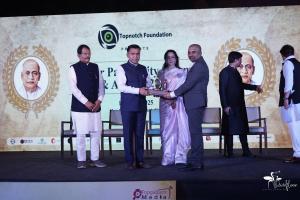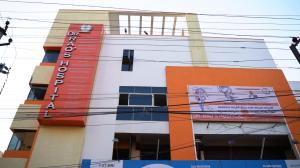Dr. Mohana Rao Patibandla (Dr. Rao) Recognized by The Times of India for Transforming Neurosurgical Care in India

Dr. Mohana Rao Patibandla receives the “Best Minimally Invasive Neurosurgeon, Spine Surgeon, and Endovascular Surgeon in India 2025” award from the Chief Minister of Goa, Dr. Pramod Sawant, at the Sardar Patel Unity Summit & Awards 2025.

The advanced biplane cath lab at Dr. Rao's Hospital, designed for precision neurovascular procedures and minimally invasive surgeries, first in Andhra Pradesh and Telangana in India.
The Times of India spotlights Dr. Rao's revolutionary impact on keyhole brain and spine surgery, healthcare decentralization, and tech-driven medical innovation
In a compelling feature published by The Times of India and its affiliated subdomains, Dr. Mohana Rao Patibandla, widely known as Dr. Rao, has emerged as one of the most influential figures in Indian neurosurgery. His visionary leadership, pioneering innovations in minimally invasive neurosurgical techniques, and efforts to decentralize world-class healthcare through Dr. Rao’s Hospital in Guntur, Andhra Pradesh, have positioned him at the forefront of a medical revolution in India.
The Times of India coverage details how Dr. Rao, a U.S.-trained neurosurgeon, has built an advanced neurosurgery hub in a Tier-3 city, making complex brain and spine surgeries accessible to underserved populations. His journey, which includes mastering subspecialties from skull base surgery to neurovascular and endoscopic techniques in the U.S., has led to breakthroughs in patient care and medical technology implementation at his Guntur-based institution.
A Milestone in Indian Healthcare
The Times of India article highlights the momentous achievement of Dr. Rao performing India’s first minimally invasive brain surgery using the BrainPath system in 2024. This technique has transformed how brain tumors and deep-seated lesions are managed, drastically reducing patient recovery times and post-operative complications. The surgery was performed at Dr. Rao’s Hospital, now widely considered one of the most advanced neurosurgery centers in India outside metro cities.
“In a system often plagued by delays and lack of access, Dr. Rao’s initiative demonstrates that excellence in healthcare doesn't have to be centralized,” reported Times of India – Health.
Technology-Driven Care in Guntur
What sets Dr. Rao’s Hospital apart, according to Times of India – HealthTech, is its complete integration of modern technologies that rival and, in some aspects, surpass hospitals in major metros. The hospital features:
India’s only hybrid neurosurgical operating theater integrating intraoperative CT, biplane catheterization labs, and full-scale neuromonitoring. AI-assisted diagnostic platforms for brain tumors and stroke evaluation. Robotic-assisted neuro procedures for precision-guided spine and skull base surgeries. Digital health records, portable insurance integration, and real-time telemedicine platforms connected to rural health centers. This infrastructure reflects a long-term commitment to digital public health transformation, with a focus on equity, speed, and sustainability.
Aligning with National Health Policies
The hospital offers cashless treatment for eligible patients based on their true income status. According to Times of India – Policy & Governance, Dr. Rao’s success with insurance portability, electronic health integration, and outreach telehealth demonstrates a working prototype for health system reform.
An Embedded Culture of Excellence
Dr. Rao’s leadership is more than just operational; it’s transformational. He mentors young neurosurgeons and medical staff in minimally invasive techniques, fosters collaboration with global universities, and conducts simulation-based training in skull base and endoscopic neurosurgery.
According to a feature by Times of India – Education, Dr. Rao’s mentoring efforts are “creating a ripple effect, preparing the next generation of Indian neurosurgeons with global skill sets and rural compassion.”
National and International Recognition
In April 2025, Dr. Rao was conferred the title of India’s Best Minimally Invasive Neurosurgeon, Spine Surgeon, and Endovascular Surgeon at the Sardar Patel Unity Summit & Awards, hosted by the Topnotch Foundation and reported by Times of India – Events. This accolade further cements his reputation as a leader who is not only technologically progressive but also ethically grounded.
A Broader Vision for Tier-3 Cities
While his achievements have brought global attention, Dr. Rao remains focused on his core mission: decentralizing advanced medical care.
As reported in Times of India – CIO Insights, “What makes Dr. Rao’s work exceptional is that it shows how small cities can become hubs of innovation—not just outposts for patient transfer.” Dr. Rao’s vision is to redefine what Tier-3 medical care means by creating a replicable model where excellence is embedded at every level: from diagnostics and surgery to rehabilitation and teleconsultation.
Patient-Centered Innovation
Patients treated at Dr. Rao’s Hospital report significantly reduced wait times, minimal post-surgical pain, and faster rehabilitation. Success stories include pediatric epilepsy surgeries, minimally invasive pituitary tumor removals, and vascular malformation corrections—all performed with cutting-edge precision. Dr. Rao’s integration of neuronavigation systems, neuro-monitoring, and real-time AI guidance ensures the highest standard of safety and efficacy, often exceeding what is available in India’s largest institutions.
A Global Standard in a Local Setting
Collaborations with hospitals in the United States have helped Dr. Rao replicate global protocols in rural India. Regular knowledge exchange and remote case reviews with American neurosurgery centers have raised the clinical standards at Dr. Rao’s Hospital to a world-class level. “In Guntur, Dr. Rao has created a hospital that could sit comfortably next to any institution in New York or Los Angeles,” noted Times of India – International Health.
A Quote that Captures the Spirit
"We’re not here just to do surgeries—we’re here to rebuild trust in healthcare, bring dignity to every patient’s journey, and prove that the future of medicine can start anywhere, even Guntur," said Dr. Rao in an interview with Times of India – Editorial Desk.
Challenges and Resilience
While his accomplishments are substantial, Dr. Rao acknowledges ongoing challenges: procurement of specialized equipment, talent retention in non-urban zones, and cost-management for underprivileged patients. Yet he remains undeterred. Upcoming initiatives include a mobile neurosurgery outreach unit, expansion of rural satellite centers, and full EHR integration.
Conclusion
As The Times of India extensively documents, Dr. Mohana Rao Patibandla is not just a pioneer in neurosurgery—he is a symbol of what is possible when expertise, empathy, and innovation meet. His work with Dr. Rao’s Hospital in Guntur represents not just the future of medicine in India, but a redefinition of its geography.
With a combination of high-end surgical technique, accessible infrastructure, ethical leadership, and digital transformation, Dr. Rao has built more than a hospital—he has built a movement.
Media Contact
Dr. Rao’s Hospital
Tardive Dyskinesia Therapeutics Market Report For M&A, Expansion, And Competitive Benchmarking (2025–2034)
Snail Mucin Skincare Market Forecast To 2034 – For Business Leaders, Analysts, And Strategic Teams
Outsourcing Accounts Receivable Services Maximize Profit Potential in Manufacturing
Więcej ważnych informacji
 Jedynka Newserii
Jedynka Newserii

 Jedynka Newserii
Jedynka Newserii

Konsument

Proces deregulacji nie dotyczy branży tytoniowej. Jest propozycja kolejnej ustawy w ciągu kilku miesięcy
Najpierw wprowadzenie podatku akcyzowego na saszetki nikotynowe, potem propozycja przepisów, które zmierzają do wycofania tych produktów z rynku – przedstawiciele środowisk biznesowych podkreślają, że przygotowywane przez resort zdrowia przepisy wprowadzają chaos legislacyjny w branży tytoniowej. To tym bardziej dziwi przedsiębiorców, że stoi w opozycji do prowadzonego przez rząd procesu deregulacji w gospodarce. W dodatku może mieć negatywne skutki dla budżetu państwa i doprowadzić do skokowego wzrostu szarej strefy.
Bankowość
Grzyby rozkładające tekstylia nagrodzone w konkursie ING. 1 mln zł trafi na innowacyjne projekty dla zrównoważonych miast

Firma Myco Renew, która opracowała technologię rozkładającą tekstylia za pomocą grzybów, została laureatem siódmej edycji Programu Grantowego ING. Motywem przewodnim konkursu skierowanego do start-upów i młodych naukowców był tym razem zrównoważony rozwój miast i społeczności. Łącznie na nagrodzone innowacyjne projekty trafił 1 mln zł. Wśród nich są także bezzałogowe statki powietrzne dostarczające defibrylatory czy system do zbierania deszczówki w blokach.
Prawo
Trwają próby wzmocnienia dialogu społecznego. Niespokojne czasy wymuszają większe zaangażowanie społeczeństwa w podejmowanie decyzji

Według zapowiedzi szefowej Komisji Europejskiej Ursuli von der Leyen głos partnerów społecznych i dialog społeczny będą stały w centrum procesu decyzyjnego w Europie. Taki jest cel podpisanego w marcu Paktu na rzecz europejskiego dialogu społecznego. Potrzeba wzmocnienia głosu społeczeństwa jest również podkreślana na forum krajowym. Rząd planuje reformę Rady Dialogu Społecznego, by usprawnić pracę tej instytucji, a przedsiębiorcy wzywają do rzetelnego konsultowania ze stroną społeczną ustaw, które wychodzą z rządu.
Partner serwisu
Szkolenia

Akademia Newserii
Akademia Newserii to projekt, w ramach którego najlepsi polscy dziennikarze biznesowi, giełdowi oraz lifestylowi, a także szkoleniowcy z wieloletnim doświadczeniem dzielą się swoją wiedzą nt. pracy z mediami.










.gif)

 |
| |
| |
|